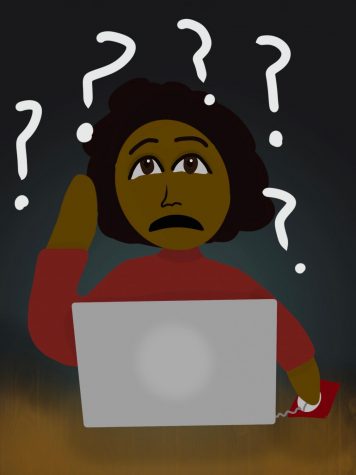Ten tips for online learning
March 23, 2020
Classes have started up again at SIU, except all students are on laptops and tablets instead of in classrooms.
While some students pursue a degree exclusively in online classes, for many students, this may be their first time being in an online classroom.
Here are ten tips to succeed in an online classroom.
Advertisement

1. Test any new software your teacher is using before the first class period
Just like finding the classroom before the first day, if you can go to class focused on what you will be learning instead of finding which button unmutes your microphone, you’ll understand the material much better.
2. Form virtual study groups
Even though you are not allowed to be in the same room, you can use apps like Google Hangouts, Skype and FaceTime and collaborate on Google Drive. Schedule times to meet and keep the conversations focused on the class.
3. If you haven’t already, start using a planner or a checklist
Your academic rhythm has been thrown off with moving to a different format. Without writing things down, it will be hard to keep track of all the dates.
4. Make sure to turn on all notifications for D2L, Outlook and any other software you may use
Advertisement*
Lots of deadlines have shifted after Spring Break was extended and some teachers will send you emails or other notifications. It’s important you’re able to see them as soon as you receive them to avoid missing deadlines and schedule changes.
5. Leave distractions in a different room, especially during online lectures
Teachers can’t enforce you being on your phone during lectures, but you still need to pay attention to your learning to grasp the material.
6. Take breaks from the screen
This is for your eyes and your brain. The American Optometric Association recommends taking a 20 second break for every 20 minutes spent looking at a digital screen by looking at an object 20 feet away to prevent digital eye strain. Additionally, the productivity app DeskTime found the top 10% of most productive workers averaged a 17-minute break after working for 52 minutes, whether working online or in-person.
7. Continue taking notes and making study guides!
Even in online lectures, having a pen and paper to keep notes will help. If your class is not returning to lectures, still regrouping information into an outline or flashcards will help you remember it for later.
8. Find an area where you can work by yourself
It may be hard, as you may be staying in a residency with many people, but even in a corner of a room away from anyone else will help you focus and get your work done.
9. Stay in contact with your teachers!
Just as much as students, teachers are still figuring how to adjust to non-classroom-based instruction. Do not be afraid to ask for a short extension because of the stress of the new platform and the virus and give them as much notice as possible to answer any questions you have.
10. Don’t be afraid to use online resources
The YouTube channels Crash Course and Khan Academy host great informative subjects on a vast variety of subjects. Quizlet has many user-generated flashcards found online for all subjects.
Guest writer Danny Connolly is the assignments editor for River Region Evening Edition and can be reached on Twitter at @DConnollyTV.
To stay up to date with all your southern Illinois news, follow the Daily Egyptian on Facebook and Twitter.
Advertisement









Taylor Hansen • Jan 6, 2021 at 10:45 am
I’m glad you mentioned doing virtual study groups to be focused in class and prepare for exams. My sister needs to finish her classes this semester online and she doesn’t do well with online classes. I’ll share this with her so she can get the right help from the professor and other classmates. https://jordahlacademy.org/online-learning
Emily Bennette • Jul 31, 2020 at 11:14 pm
This is some really good information about studying online. My sister wants to get a degree online but isn’t sure if she should do anything differently. Thanks for pointing out that it might be best to look into doing some virtual study sessions. That could help her do better in some of the subjects that she struggles with. https://cbet.edu/bmet-degree
Liliana Acuna • Mar 24, 2020 at 4:45 pm
As an academic community, we are in a time of concerns not only about how to survive, but also adapt as a university at a relatively quick pace to recreate student learning opportunities where students can continue to thrive. We ask that whether you be a professor, an administrator, a teaching assistant, or any other official who deals with students on a regular basis in a position to help students develop themselves as students, academics, and professionals, that you take into consideration the unique concerns our more “marginalized” student populations may be facing right now as they also work to adapt.
Much has been said about the necessities for self-quarantine and social distancing; much work has been done to insure students could receive emergency supplies of food; and much work has also been done to provide students without internet access or laptops alternatives to continue their semester’s courses. We also recognize the vast amount of effort individual professors, teaching assistants, and others, have done to offer these courses online in a timely fashion, as well as the librarian staff as it also works to set up alternative ways of receiving materials. We praise these efforts as they take student well-being into consideration, but note these barriers are not the only ones that students may face right now as everyone is trying to make this transition, and note that without necessary critique we may find these stresses inequitably impacting student’s educational futures along lines of socioeconomic status.
It is well known that SIU-C has a reputation of educating a relatively high percentage of historically underserved student populations, and as such, these student populations may be facing more strains in this transition than the typical college student. These are strains which will impact their ability/quality for/of participation, even though this population may be composed of the most individually resilient, motivated, and determined individuals. In other words, it is not the irresponsibility or lack of passion that will inhibit these students during transition, but the quantity of resources suddenly pulled from them at the last minute which historically underserved populations are more likely to be reliant on.
As an anecdotal example, students relying on the books “on reserve” or receiving new books from i-SHARE (for books not owned by SIU’s library) for their coursework no longer have access to these materials as precautions are being taken to limit COVID-19 spread, and students waiting until after the break to pick up books physically at the library now have to wait until the single librarian can go through the queue and collect, check out, and process all student requests. Of course, this is after the student learns the new procedure for how to check out a book in the first place and files the request. These transitions will take time on all parts, and we recognize the strain on the systems we have in place (such as library resources) is no fault of any individual/department, but it will impact resourceful students who use the library as their means of acquiring materials for coursework at higher rates. These students are most likely actively engaging to find alternative sources for access to these materials, and those with the financial means to do so may turn to finally buying these materials, but be faced with wait times for books to arrive which exceed course deadlines. This is not due to their irresponsibility and lack of foresight as individuals trying to be prepared for class, but rather, due to the change of circumstances drastically impacting the resources once afforded to them. This is to serve as an example only as there are also a myriad of other struggles other students may be facing that are particular to COVID-19 transitions which we simply do not have the space to advocate for in full here.
Thus, if you receive correspondences from your students trying to include you in the discussion of where they are in a situation of acquiring new resources, please do not disregard them as irresponsible and avoidable–if they simply bought the book at the beginning of the semester for example, as you may have been privileged to do when you were in their situation. The “back to business as usual” mindset ignores that there is no utopic “usual” that students are returning to. We want to recognize that those who find themselves in better circumstances during this transition are probably there because they find themselves in places of privilege in one way or another. This is to not discount the work they did to guarantee those comforts, but rather, to open our minds to which kinds of populations we want to include in our institutional nurturing in this transition, and make sure their unique situations are also taken into consideration as you compare the work students are able to produce.
We ask you please take into mind the population SIU-C proudly serves and the unique situation your students may find themselves in. Many of these individuals have probably already proved themselves as dedicated and motivated individuals, but many others may still be doing the work to afford that reputation. Please remember your historically marginalized students are at a disadvantage and may need more time to adjust to online classes. How you treat students during this time, and take into consideration how their changing positionalities might impact their academic records this semester, has the ability to significantly impact their futures after SIU-C. These unforeseeable barriers work on lines of socioeconomic status, and if we do not take it into account we will unfortunately (re)create more inequities in the next generation of professionals. Rather, we have the ability to, and we ask you to, nurture the diverse group of individuals in our student population during this time, so that they may also comprise the population of the future’s fields by taking these arising situations into account and offering flexibility and communication as we transition. Please do not allow COVID-19 and the normative approaches to education in a time lacking of normalcy during this transition to be the barrier which hinders diversification of these fields.
Sincerely,
Undergraduate Student Anthropology Association
Students Promoting Educational Advancement and Research (SPEAR)
Kappa Delta Chi Sorority, Inc. Alpha Omega Chapter
Hispanic Student Council
Saluki Rainbow Network President
President, Delta Phi Delta Dance Fraternity Inc.
Indian Student Association
Alpha Phi Alpha Fraternity Inc.
Society of Hispanic Professional Engineers
President of Malaysian Student Association
Healing Hands
Delta Zeta
American Sign Language Club
SPREKK Technology Services, LLC
Saluki Entrepreneur Core
Organization for Women, Gender, and Sexuality Studies (WGSS RSO)
Lambda Theta Phi Latin Fraternity, Inc.